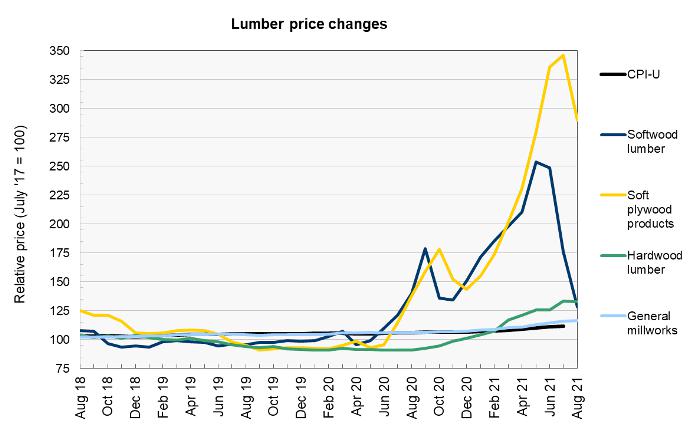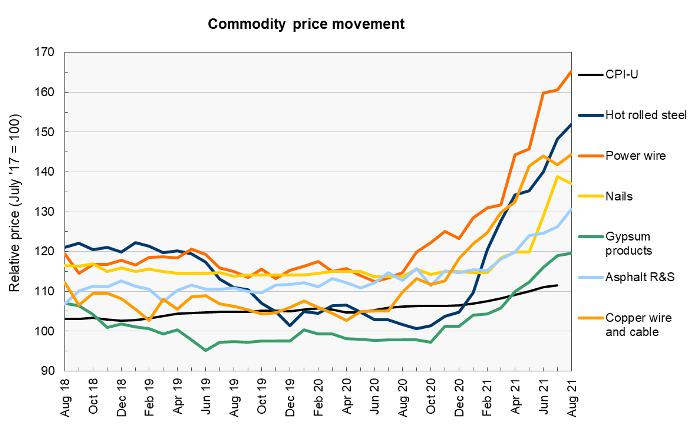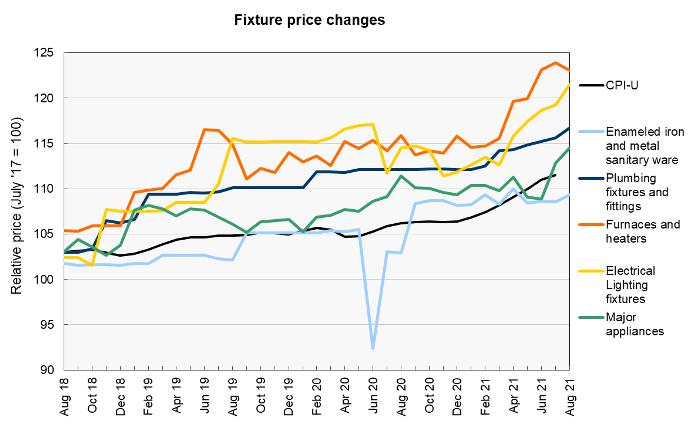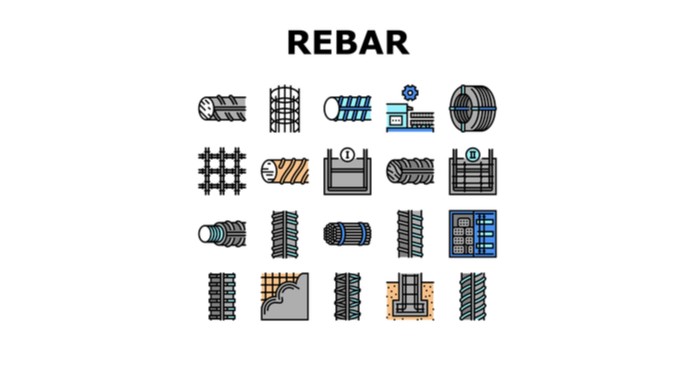The Bureau of Labor Statistics (BLS) released its producer price index report for August 2021. It showed that construction components and materials prices were up 0.2 percent in the month, seasonally adjusted. The index of materials and components for construction was 19.0 percent higher than its year-earlier level.
Overall prices for processed goods for intermediate demand rose by 0.9 percent in the month. The index was 23.0 percent higher than its year-ago level.
For reference, the changes in these indices compare with a 5.3 percent rise in the all-items consumer price index (CPI-U) for the 12 months ending in August. The CPI-U was up 0.3 percent for the month.
The shelter portion of the CPI-U was up 0.2 percent in August. It was up 2.8 percent over the prior 12 months.
Yield Pro (PRO) compiled the BLS reported price changes for our standard list of construction commodities. These are commodities whose prices directly impact the cost of constructing an apartment building. The two right hand columns of the table provide the percent change in the price of the commodity from a year earlier (12 Mo PC Change) and the percent change in price from July 2021 (1 Mo PC Change). If no price data is available for a given commodity, the change is listed as N/A.
For this report, a new column, labeled Pre-covid Change, was added to the table. This column lists the change in the current construction materials prices relative to the average prices in the first three months of 2020, before the pandemic impacted the economy. This may give a truer idea of the magnitude of the recent price increases for commodities, such as lumber, whose prices were already rising sharply last summer.
| Commodity | 12 Mo PC Change | 1 Mo PC Change | Pre-covid Change |
| Softwood lumber | -9.8 | -27.3 | 24.4 |
| Hardwood lumber | 44.3 | -0.3 | 45.2 |
| General millworks | 9.6 | 0.5 | 11.1 |
| Soft plywood products | 87.3 | -16.3 | 210.8 |
| Hot rolled steel bars, plates and structural shapes | 49.0 | 2.4 | 44.3 |
| Copper wire and cable | 31.4 | 1.9 | 36.3 |
| Power wire and cable | 39.8 | 3.0 | 42.2 |
| Builder’s hardware | 11.7 | 1.6 | 11.5 |
| Plumbing fixtures and fittings | 4.1 | 1.0 | 4.9 |
| Enameled iron and metal sanitary ware | 6.4 | 0.7 | 3.9 |
| Furnaces and heaters | 6.2 | -0.7 | 8.9 |
| Sheet metal products | 25.7 | 1.9 | 25.1 |
| Electrical Lighting fixtures | 6.0 | 1.9 | 5.4 |
| Nails | 19.3 | -1.3 | 19.7 |
| Major appliances | 3.5 | 1.5 | 7.6 |
| Flat glass | 12.6 | 0.2 | 12.6 |
| Ready mix concrete | 5.1 | 1.6 | 5.5 |
| Asphalt roofing and siding | 15.8 | 3.5 | 16.5 |
| Gypsum products | 22.9 | 0.5 | 19.9 |
| Mineral wool insulation | 21.9 | 5.8 | 19.6 |
The first chart, below, shows the price index history for wood products over the past 25 months. Note that the prices used in compiling the indexes are collected on the Tuesday of the week containing the 13th day of the month. In August 2021 that would have been August 10.

While the BLS reported that the price of softwood lumber is down for both the month and the year, this is partly due to the fact that the price spiked in August of last year. The price of softwood lumber is still up significantly from the level seen before the pandemic.
The wholesale market price of lumber has recently been within +/- $50 of $500. It closed on August 10 at $505 and closed on September 9 at $510. Lumber prices in the futures markets have firmed slightly since last month. The January 2022 contract was trading around at $607 as of mid-September, up $60 over the last month. Prices of futures contracts further out are thinly traded and so may be of limited use as a signal of the market’s direction.
The price of soft plywood products fell this month, according to the BLS. However, the price of soft plywood products is still three times its level before the pandemic. This is by far the highest rate of price appreciation of any of the construction materials we track.
The next chart, below, shows the recent history of several other construction materials prices. Prices were up for most of the products with high metal content with power wire prices rising 3.0 percent in the month. Nail prices were an exception to this rule, falling 1.3 percent. However, nail prices are up nearly 20 percent from pre-pandemic levels.

MarketWatch reports that the NYSE American steel index closed on August 10 at $1,899 but closed on September 9 at $1,729. Steel futures indicate that prices will decline only gradually over the next 12 months. The January 2022 contract was priced at $1,680 recently, up $115 since we last reported on it.
The price of copper dropped as low as $4.04 per pound in mid-August but closed on September 9 at $4.29. This is down slightly from its level last month.
The price of aluminum continued its rise over the past month. It closed at $2,840 on September 9, up $265 from its level in our last report.
The other construction materials prices tracked in this chart have been rising since early this year. The prices of gypsum products and asphalt roofing and siding have posted double-digit gains year-over-year.
Price changes for several of the more finished goods from our sample are illustrated in the final chart, below. While prices for major appliances and for electrical lighting fixtures rose significantly for the month, the items in this chart comprise most of the construction materials from our table whose annual price rises are still in single digits.

The full BLS report can be found here.












